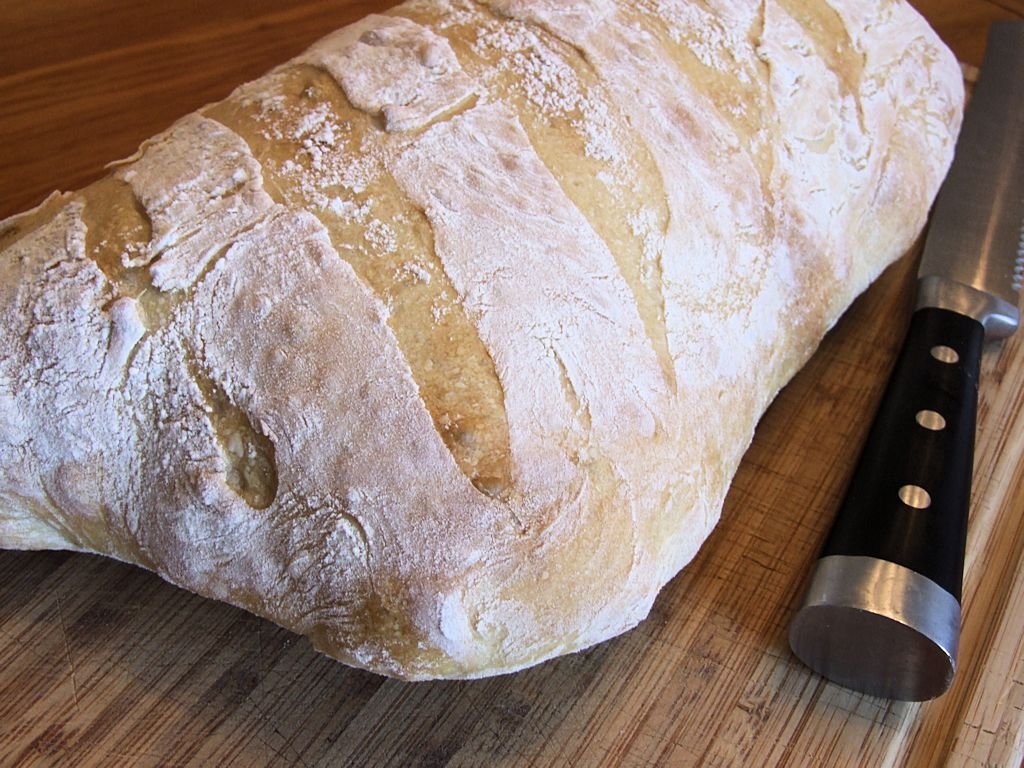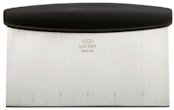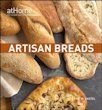After making mozzarella last weekend, I ended up with nearly as much whey as the amount of milk I started with. I didn’t feel I could just through this delicious, slightly fluorescent green coloured liquid away. After a bit of research on some cheese making blogs, I found some people where using whey as a substitute for water or milk when baking bread. Since I was in an Italian cooking frame of mind, I decided to make some ciabatta.
I was feeling a bit rushed when I made the ciabatta, and was doing the recipe from memory. Instead of making a small biga (starter), I made up the whole bread dough in one go. What’s the worst that could happen. Well the yeast must have thought they were in heaven with all that lactose to eat up from the whey, because when I came into the kitchen the next morning, the dough had increased to monstrous proportions, escaped from the bowl and was making a break for it across the kitchen counter. The dough that had escaped from under the plastic wrap had dried out and wasn’t able to be used, but in reality there was a lot of wastage.
The main lesson I’ve learnt when using whey in bread is that it will produce very vigorous rising. During the proofing there was a fantastic ‘beery’, yeasty smell coming from the dough, not unlike a brewery and after baking the bread was more more-ish than usual, with a slight sourdough flavour because of the whey. It also ballooned up more than any ciabatta that I have made in the past, with a more open texture with larger bubbles.
Whey bread ciabatta
I’m including the ingredients and method the way that I made this bread, but since it is quite a vigorous dough, I would suggest using my previous ciabatta recipe to make a biga, but substitute the water with whey. However if you do feel brave enough to make the bread using this method, use a bigger bowl.
Total time:9 hours
Ingredients
- 2 cups (475ml) of whey
- 5 cups (1100g) of strong white bread flour
- 1 tsp of dry active yeast
- 3 tbsp of sugar
- 1 tsp of salt
- 2 tbsp of melted unsalted butter
Method
- Mix all of the ingredients together in a large bowl, and the kneed the dough for about 5 minutes.
- Cover the bowl with plastic wrap and leave it to rise for about 8 hours or overnight.
- Cover a work surface in flour, turn out the dough and pull it into a long oblong.
- Place the dough onto a greased baking tray. Sprinkle on a little more flour. Optionally you can cut a few shallow, diagonal slashes into the top of the bread.
- Bake the bread in a 375F (190C) oven for 40mins or until it is golden brown. Remove from the oven and allow to cool before eating.













16 comments
Skip to comment form
Hi,
Was the whey you used for this beautiful bread sweet or acidic whey?
I’m a little confused because I’ve been reading that you can only use sweet whey in breads (whey that comes from cheeses made with a bacterial culture, not with acids like lemon juice or vinegar).
I’m trying to find out if I could use the whey leftover from the ricotta cheese and yogurt I made in place of water for baguette dough, but it would fall into the acidic category, so according to those posts it wouldn’t work.
I’d appreciate any input you could give me.
Thanks.
hi,
does yogurt fall under the acid category? And I believe that yogurt is made from bacterial culture
Author
Yes yogurt does fall into the acid category and made from a bacterial culture
Could I use a mix of gluten free flours for this?
Author
I don’t think so as most gluten free flour mixes are pretty weak at holding large bubbles. Why don’t you try it with a little bit and let us know what happens
Excellent!!! I made it with yogurt whey, so delicious. Thanks for the recipe.
Does this need to proof a second time between pulling it oblong and baking?
Author
It depends on how much you handle the dough. If you were quite rough with it, give it 30mins just to rest before baking
Make a note to add more water/whey in the winter! I’m in Wisconsin and I forgot, so my dough was reeeeally stiff with just the amount called for, and I measured by weight.
Can I substitute olive oil for the butter?
Author
Yes, of course if you want. Just add 2 tbsp of olive oil instead
I’ve made this quite a few times now and it always turns out great. The last few times I’ve used oils instead of butter (olive oil, avocado oil, whatever is handy!) Works really well. I’ve also been throwing in some herbs. Last time I used herbs de provence, this time I threw in garlic, basil, shallot, and black pepper. It’s in the oven now and the whole house is warm with the aroma!
Thanks for the great recipe!
This is delicious! I made it with whey leftover from making ricotta and it worked perfectly. I made it in the morning before work (maybe 8 minutes of work total) and baked it when I got home. Wish I could post a picture! It’s beautiful-and huge!
Thank you, my first try using whey and it taste wonderful.
I was using grams instead of cups and had to increase the amount of whey with 33% to the amount of flour suggested in grams.
also added a few tsps of my sourdough starter.
divided in to two and left to ferment. it came up amazing. quadruple in size with massive bubbles and had not collapsed after 9 hours proving.
but when taking out of the proving bowl and gently shaping most of the air dispersed and I ended up with a final loaf more like a sandwich loaf.
i.e. i did not do a secondary prove after shaping, it went straight in to the oven.
I think that perhaps shaping after 4h and then a second ferment of 4h would have worked better.
all the best
Per Norrgren
Hello,
I tried using whey once when making bread but i found black spots on the top in the morning. Only on the surface, it was totally okay on the inside. Do you know why?
Nice! Thanks for sharing a great recipe! I love this recipe